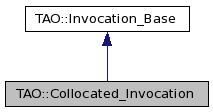Class for Collocated invocations. More...
#include <Collocated_Invocation.h>


Public Member Functions | |
| Collocated_Invocation (CORBA::Object_ptr t, CORBA::Object_ptr et, TAO_Stub *stub, TAO_Operation_Details &detail, bool response_expected=true) | |
| Constructor used by TAO::Invocation_Adapter. | |
| Invocation_Status | invoke (Collocation_Proxy_Broker *cpb, Collocation_Strategy strat) |
Private Member Functions | |
| Collocated_Invocation (void) | |
Class for Collocated invocations.
Definition at line 50 of file Collocated_Invocation.h.
| TAO::Collocated_Invocation::Collocated_Invocation | ( | CORBA::Object_ptr | t, | |
| CORBA::Object_ptr | et, | |||
| TAO_Stub * | stub, | |||
| TAO_Operation_Details & | detail, | |||
| bool | response_expected = true | |||
| ) |
Constructor used by TAO::Invocation_Adapter.
| t | The target on which invocation first started. | |
| et | The effective target in which this invocation is now flowing | |
| stub | Stub for effective target et | |
| detail | operation details of the invocation including the service context list | |
| response_expected | flag to indicate whether the operation encapsulated by detail returns a response or not. |
Definition at line 10 of file Collocated_Invocation.cpp.
: Collocated_Invocation.cpp 81632 2008-05-07 09:19:05Z vzykov $") TAO_BEGIN_VERSIONED_NAMESPACE_DECL namespace TAO
| TAO::Collocated_Invocation::Collocated_Invocation | ( | void | ) | [private] |
| Invocation_Status TAO::Collocated_Invocation::invoke | ( | Collocation_Proxy_Broker * | cpb, | |
| Collocation_Strategy | strat | |||
| ) |
Invocation on the collocated object mediated through this class. Practically this method is a place holder to do the following
Start the interception point
Definition at line 25 of file Collocated_Invocation.cpp.
: Invocation_Base (t, et, stub, detail, response_expected, false /* request_is_remote */ ) { } Invocation_Status Collocated_Invocation::invoke (Collocation_Proxy_Broker *cpb, Collocation_Strategy strat) { Invocation_Status s = TAO_INVOKE_FAILURE; /// Start the interception point #if TAO_HAS_INTERCEPTORS == 1 s = this->send_request_interception (); if (s != TAO_INVOKE_SUCCESS) return s; #endif /*TAO_HAS_INTERCEPTORS */ try { if (strat == TAO_CS_THRU_POA_STRATEGY) { // Perform invocations on the servant through the servant's ORB. CORBA::ORB_var servant_orb = this->effective_target ()->_stubobj ()->servant_orb_ptr (); TAO_ORB_Core * const orb_core = servant_orb->orb_core (); TAO_ServerRequest request (orb_core, this->details_, this->effective_target ()); TAO_Request_Dispatcher * const dispatcher = orb_core->request_dispatcher (); // Retain ownership of the servant's ORB_Core in case // another thread attempts to destroy it (e.g. via // CORBA::ORB::destroy()) before this thread complete the // invocation. orb_core->_incr_refcnt (); TAO_ORB_Core_Auto_Ptr my_orb_core (orb_core); dispatcher->dispatch (orb_core, request, this->forwarded_to_.out ()); if (request.is_forwarded ()) { this->reply_status_ = GIOP::LOCATION_FORWARD; } } else { bool is_forwarded = false; cpb->dispatch (this->effective_target (), this->forwarded_to_.out (), is_forwarded, this->details_.args (), this->details_.args_num (), this->details_.opname (), this->details_.opname_len (), strat); if (is_forwarded) { this->reply_status_ = GIOP::LOCATION_FORWARD; } } // Invocation completed succesfully s = TAO_INVOKE_SUCCESS; #if TAO_HAS_INTERCEPTORS == 1 if (this->reply_status_ == GIOP::LOCATION_FORWARD || this->response_expected_ == false) { if (this->reply_status_ == GIOP::LOCATION_FORWARD) this->invoke_status (TAO_INVOKE_RESTART); s = this->receive_other_interception (); } // NOTE: Any other condition that needs handling? else if (this->response_expected ()) { this->invoke_status (TAO_INVOKE_SUCCESS); s = this->receive_reply_interception (); } if (s != TAO_INVOKE_SUCCESS) return s; #endif /*TAO_HAS_INTERCEPTORS */ } catch ( ::CORBA::UserException& ex) { // Ignore CORBA exceptions for oneways if (this->response_expected_ == false) return TAO_INVOKE_SUCCESS; #if TAO_HAS_INTERCEPTORS == 1 PortableInterceptor::ReplyStatus const status = this->handle_any_exception (&ex); if (status == PortableInterceptor::LOCATION_FORWARD || status == PortableInterceptor::TRANSPORT_RETRY) s = TAO_INVOKE_RESTART; else #endif /* TAO_HAS_INTERCEPTORS */ { // Check whether the user exception thrown matches the signature // list, if not, then throw an Unknown exception if (!this->details_.has_exception (ex)) { throw ::CORBA::UNKNOWN (CORBA::OMGVMCID | 1, CORBA::COMPLETED_MAYBE); } else { throw; } } } catch ( ::CORBA::SystemException& TAO_INTERCEPTOR (ex)) { // Ignore CORBA exceptions for oneways if (this->response_expected_ == false) return TAO_INVOKE_SUCCESS; #if TAO_HAS_INTERCEPTORS == 1 PortableInterceptor::ReplyStatus const status = this->handle_any_exception (&ex); if (status == PortableInterceptor::LOCATION_FORWARD || status == PortableInterceptor::TRANSPORT_RETRY) s = TAO_INVOKE_RESTART; else #endif /* TAO_HAS_INTERCEPTORS */ throw; } #if TAO_HAS_INTERCEPTORS == 1 catch (...) { // Notify interceptors of non-CORBA exception, and propagate // that exception to the caller. PortableInterceptor::ReplyStatus const st = this->handle_all_exception ();
 1.7.0
1.7.0